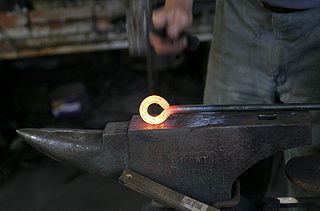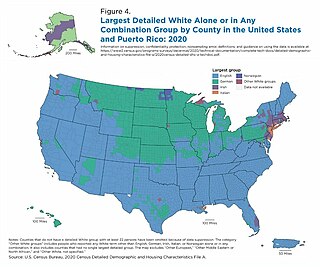Related Research Articles

A banshee is a female spirit in Irish folklore who heralds the death of a family member, usually by screaming, wailing, shrieking, or keening. Her name is connected to the mythologically important tumuli or "mounds" that dot the Irish countryside, which are known as síde in Old Irish.
A sept is a division of a family, especially of a Scottish or Irish family. The term is used in both Scotland and Ireland, where it may be translated as sliocht, meaning "progeny" or "seed", which may indicate the descendants of a person. The word may derive from the Latin saeptum, meaning "enclosure" or "fold", or via an alteration of "sect".

Akins is a Scottish surname and northern Irish family name.

Smith is an occupational surname originating in England. It is the most prevalent surname in the United Kingdom, the United States, Australia, Canada, and New Zealand, and the fifth most common surname in the Republic of Ireland. In the United States, the surname Smith is particularly prevalent among those of English, Scottish, and Irish descent, but is also a common surname among African-Americans, which can be attributed either to African slaves having been given the surname of their masters, or to being an occupational name, as some southern African-Americans took this surname to reflect their or their father's trade. 2,442,977 Americans shared the surname Smith at the time of the 2010 census, and more than 500,000 people shared it in the United Kingdom as of 2006. At the turn of the 20th century, the surname was sufficiently prevalent in England to have prompted the statement: "Common to every village in England, north, south, east, and west"; and sufficiently common on the (European) continent to be "common in most countries of Europe".

The surnames McCabe and MacCabe are Irish and Scottish surnames. McCabes are considered to have moved from the Western Isles of Scotland to Ireland sometime around 1350. McCabes are now found mostly in the United States, Ireland and the United Kingdom, Australia, South Africa, and New Zealand.
Christopher Plunket, 2nd Earl of Fingall and 11th Baron Killeen was an Irish politician and soldier. In 1641 he negotiated with the rebels on behalf of the Old English of the Pale and pushed them to join the rebellion. He fought for the rebels at the siege of Drogheda. He joined the Confederates and fought in their Leinster army, notably at Dungan's Hill. When the Confederates fused into the Royalist Alliance, he fought under James Butler, 1st Duke of Ormond in the Battle of Rathmines where he was wounded and taken prisoner. He died of his wounds two weeks later in captivity at Dublin Castle.
McCawley and MacCawley are surnames in the English language. The names are Anglicisations of several Gaelic-language surnames. There are several etymological origins for the names: all of which originated as patronyms in several Gaelic languages—Irish and Scottish Gaelic. Although the English-language surnames are ultimately derived from Gaelic patronyms, the English-language surnames, and the modern Gaelic-language forms do not refer to the actual name of the bearer's father or grandfather. The surnames are not very common.
Matheson is a surname derived from either an anglicised form of Scottish Gaelic surnames or the patronymic form of a short form of the English Matthew. This English personal name is ultimately derived from the Biblical Hebrew מַתִּתְיָהוּMatheson is Mathyson, recorded in 1392; this recorded name literally means "son of Mathi"—Mathi being a pet form of Matthew. Two different Scottish Gaelic surnames have been Anglicised Matheson. One such surname is Mac Mhathghamhuin, which became Anglicised Matheson on account of its similar sound. This Gaelic surname is of an entirely different etymology than Matheson, as the Gaelic mathghamhuin means "bear". Another Gaelic surname Anglicised Matheson is Mac Matha. This Gaelic surname is derived from the patronymic form of a Gaelic form of Matthew.

Chōji (長治) was a Japanese era name after Kōwa and before Kajō. This period spanned the years from February 1104 through April 1106. The reigning emperor was Emperor Horikawa-tennō (堀河天皇).
The surname Scales has more than one possible origin.
Cawley is a surname in the English language. There are several different origins of the surname. In some cases the surnames are derived from any of numerous place names in England. In other cases the surnames are derived from any of several Gaelic language surnames.

English Americans are Americans whose ancestry originates wholly or partly in England. In the 2020 United States census, English Americans were the largest group in the United States with 46.5 million Americans self-identifying as having some English origins representing (19.8%) of the White American population. This includes 25,536,410 (12.5%) who were "English alone". Despite being the largest self-identified ancestral origin in the United States, demographers still regard the number of English Americans as an undercount. As the majority of English Americans are the descendants of settlers who first arrived during the English Colonial period which began over 400 years ago, many Americans are either unaware of this heritage or choose to elect a more recent known ancestral group even if English is their primary ancestry.
MacLeòid or MhicLeòid is a masculine surname in Scottish Gaelic. The name translates into English as "son of Leòd", and the feminine form is NicLeòid: a contraction of "Nighean-Mhic-Leòid", meaning "daughter of the son of Leòd." These surnames originated as patronymic names; however, they no longer refer to the actual name of the bearer's father or grandfather. There are numerous Anglicised forms of MacLeòid.

Raven is a given name in the English language. While it may be given to boys and girls, it is more frequently a feminine name. In the United States of America the name has ranked among the top 1,000 names given to baby girls since 1977.
McCauley and MacCauley are surnames in the English language. There are several etymologically unrelated origins for the names: all of which originated as patronyms in several Gaelic languages—Irish and Scottish Gaelic. Although the English-language surnames are ultimately derived from Gaelic patronyms, the English-language surnames, and the modern Gaelic-language forms do not refer to the actual name of the bearer's father. The Irish McCauley's originated in county Westmeath in the Irish Midlands, province of Leinster, where at one time the area which is now Ballyloughnoe was once called "McGawley's Country, the scottish McCauleys are partly descended from the Irish McCauleys as the Irish moved to Scotland offered land by Robert the bruce" The English-language surnames are generally popular in certain parts of Ireland—both in the Republic of Ireland and Northern Ireland. According to census records in the United States of America, "MCCAULEY" (McCauley) is a somewhat common surname, although "MACCAULEY" (MacCauley) is extremely rare.
MacAlley and McAlley are unisex surnames in the English language. There are several origins for the names.
Macaulay, McAuley, MacAuley, and Macauley are Scottish and Irish surnames. There are several etymological origins for the names: all of which originated as patronyms in Gaelic languages—Irish and Scottish Gaelic. Although these English-language (Anglicized) forms of the surnames are ultimately derived from Gaelic patronyms, they do not refer to the actual name of the bearer's father. The surname is quite common in Ireland, particularly in Ulster.
Macaulay, Macauley, MacAulay, McAulay and McAuley are surnames of Irish origin originating in Westmeath, Leinster anglicized from Irish Mac Amhalghaidh in the English language. The surname is also found in Scotland of distinct, but related origins due to Irish settling in Scotland. Some of the Irish Macaulay's settled in Scotland during the reign of Robert the Bruce. There are several etymological origins for the names: all of which originated as patronyms in several Gaelic languages—Irish and Scottish Gaelic. Although the English-language surnames are ultimately derived from Gaelic patronyms, the English-language surnames, and the modern Gaelic-language forms do not refer to the actual name of the bearer's father.
Altham is a surname of English origin, based on the placename Altham, Lancashire. The surname emerged at a time when Altham was in the ancient parish of Whalley; Altham is now in the Burrough of Hyndburn. The first form of the surname was likely Elvetham, which was first recorded around 1150 and which persisted into the 12th and 13th centuries. The original form of the surname was based on the Old English name for the placename origin, "river meadow of the swans" hamm elfitu. Evolution of the surname included variants de Eluetham in the 13th century, de Aluetham in the 14th century, Aluetham and Alvetham in the 14th century, with the appearance of Altham in the 14th century.
Luke Plunket, 3rd Earl of Fingall (1639–1684) was an Irish soldier and politician. He was one of the signatories of the Catholic Remonstrance of 1661.
References
- 1 2 3 Neafsey, Edward (2002), "McComb", All New Surnames of Ireland (Google Books), Kansas City, Missouri, United States: Irish Genealogical Foundation, p. 38, ISBN 978-0-940134-97-3, OCLC 49351083 , retrieved 1 Jan 2012
- ↑ Reaney, Percy Hide; Wilson, Richard Middlewood (1991), A dictionary of English surnames (Google Books), Tavistock classics in the history of psychiatry (3rd ed.), London; New York: Routledge, p. 2039, ISBN 978-0-415-05737-0, OCLC 22345901 , retrieved 1 Jan 2012
- ↑ Bowditch, Nathaniel Ingersoll (1861), "Surnames from Christian Names or Ending in Old Saxon Words", Suffolk surnames (Google Books) (3rd ed.), Boston: Trübner & Company, p. 409, OCLC 60714173 , retrieved 1 Jan 2012
- ↑ Smith, Elsdon Coles (2003), "Surnames from Father's Name", American Surnames (4th printing) (Google Books), Baltimore, Maryland, United States: Genealogical Publishing Company, p. 69, ISBN 978-0-8063-1150-0, OCLC 13553340 , retrieved 1 Jan 2012